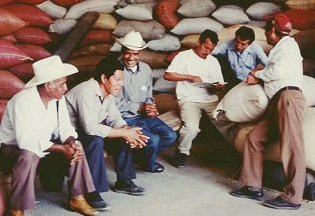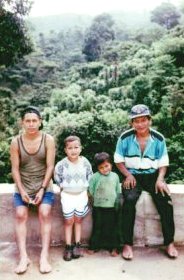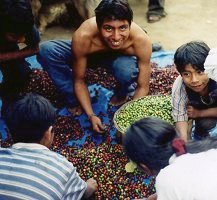# Projects in Coffee-Producing Communities
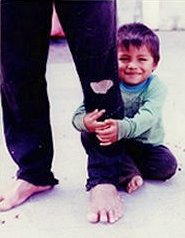
In each cup of coffee there are stories of the lives of people who grew it, their wishes and dreams as well as the difficulties they endure. Coffee drinkers do have a choice about the impact of their purchase in coffee-producing countries. It is worth considering whether your morning coffee perpetuates poverty and environmental destruction or if it supports economic justice, sustainable agriculture and reforestation.
This page has postings from Sexto Sol's work over the years to assist small-scale coffee growers to export their coffee for a better price than is normally paid in their region.
# Assistance to former refugees as they adapt to life after exile
Our association with ARDIGUA, the Asociacion de Refugiados Dispersos de Guatemala, began in 1994 while the refugees were in exile in Motozintla, Chiapas. Dr. Brennan provided mental health assistance and training and Francisco Barrios gave workshops on solar ovens in 1994 and 1997. Currently, families who are original members of ARDIGUA are farming coffee on collective farms in Guatemala, a few hours from the Sexto Sol office.
In exile the refugees decided that their best chance of survival upon repatriation would be to work together in Proyectos Productivos Populares – community-based collective enterprises. In support of that choice Sexto Sol assists them to maintain group cohesiveness despite difficult times and to establish an alternative source of income. The communities are located in the heavily forested escarpment known as the Costa Cuca where coffee farming has preserved some of the tree canopy and thus biodiversity.
In 2002, given the dismal coffee prices, Nuevo Bullaj community of 45 families was considering cutting down rainforest to plant other crops. We presented them with the idea of selling their excellent coffee in the Specialty Coffee Market where they can receive premium prices. With our help, they achieved Fair Trade and organic certification and now have successfully exported their coffee each year to Royal Coffee. The importer Royal Coffee, in the spirit of partnership has provided the community with pre-financing which allows them to harvest the crop without expensive bank loans. The company has generously underwritten improvements to the processing plant and made a gift of funds with which Sexto Sol expanded and stretched into over two-thousand dollars worth of books and encyclopedias for the community library.
As an alternative source of income, we are raising funds to renovate the former plantation house into an eco-hotel suitable to receive tours. Sexto Sol will provide assistance with promotion and training in hospitality services. The views and forest make this an attractive destination for eco-tourists.
Since 2000 we have assisted Nuevo Eden cooperative, also a repatraited refugee community, to find a viable means of increasing community income. The coffee is not suitable for the Specialty Market so we are assisting the 15 families to market the macadamia nuts from trees planted to provide shade to the coffee. In 2002 we took representatives for training in how to produce and process the nuts. They have since sold one crop, a new source of income.
# You can help by asking your local roaster for sustainably produced coffee from small-scale grower organizations
Ask for Fair Trade coffee and support coffee roasters who offer it. These pro-active businesses actually choose to pay more for the coffee in order to provide a fair price to growers. Give them your business. If you are a roaster, restaurant or business that offers fair trade coffee to your customers, you too are a hero in the effort to bring more justice to the commerce in coffee.
Also – While most coffee in the Sierra Madre of Chiapas is produced without chemicals, getting certified as organic is very expensive. Nevertheless, those farmers who have the resources to have their farms certified receive a better price for their environmentally sound coffee. Buying organic coffee is good for the environment and good for growers. (Organic Coffee Association - www.orca.org) For more information contact the Sexto Sol Center, tamara@sextosol.org or francisco@sextosol.org.
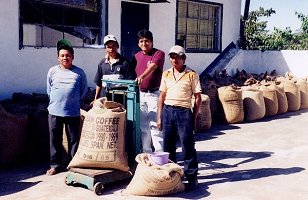
# Members of Nuevo Bullaj Cooperative and
Francisco Barrios, Sexto Sol Program Coordinator
March 15, 2004
Dear Friends of Coffee Farmers and the Sexto Sol Center:
Everyone likes to hear about a success. Let me tell you about one that has changed the lives of people who once lived in exile as refugees.
The Asociacion de Campesinos de Nuevo Bullaj is proud to tell you that their coffee Nuevo Magnolia Miramar will be offered to the people of Portland, Oregon by Stumptown Coffee Roasters. We are grateful to Royal Coffee Company of California, who imported the coffee, for seeing the potential of this earnest cooperative and for being willing to invest in their growth. This new partnership between Nuevo Bullaj, Royal and Stumptown promises to be a long-term relationship. And since coffee is really about people, there is every reason to believe that the partnership will become a fast friendship that transcends borders.
This success is the culmination of a ten-year effort by the Sexto Sol Center to assist refugees from Guatemala's dirty war to establish a stable and dignified life in their homeland. The I Ching, the Book of Changes, reminds us that "Perseverance furthers." The roots of the problems of indigenous people in the Americas go back 500 years with the war in Guatemala being but one horrible chapter.
Royal and Sexto Sol are hopeful that Nuevo Bullaj will obtain the fair trade certification in time for next year's sale. In the meantime, Royal has offered the possibility of pre-financing for the next harvest which means that they will no longer have to enter into an agreement with the local loan sharks for loans (at 36%) to pay the costs of producing the coffee. This alone has changed their lives. This alone now means that they can begin to get out of the survival mode that has caused them so much stress since 1981. Now they are no longer refugees, but empresarios!
So cheer along with us. It is not just coffee that we are taking about but a long, long journey to a sense of mental peace. That it finally comes is justice.
Thank you to all of you who played a part in making this possible.
Next on the agenda - we are helping Nuevo Bullaj to convert the old plantation house into an attractive Eco-Lodge for tours of people interested in seeing how coffee is produced in the rainforest. We will also provide technical assistance to help each family establish permaculture-style food systems in their homes and to fill all communal space with food bearing trees and shrubs. Also, a cooperative farm nearby of demobilized guerilla fighters wants Sexto Sol to assist them to export their coffee. A honey cooperative in the area has also asked for our assistance.
If you or your business might be interested in helping Sexto Sol to assist these cooperatives, please see www.sextosol.org for information on how you can help by making a tax-deductible contribution.
# The Sexto Sol Center’s Work on Behalf of Coffee Growers
Since 1997, the Sexto Sol Center has organized small-scale farmers into cooperatives and worked to help them become export-ready so that they might earn a better price for their coffee (See “from our archives” below for more on that effort). We have helped them to achieve the best price possible year after year. Our strategy has been to prepare them to qualify for organic certification and to enter into the Fair Trade market in order to work toward the goal of earning a more stable price. Our aim has been to propel small grower organizations into direct relationships with buyers from the Specialty Coffee Market. Part of this work has been to educate roasters and others in the coffee industry about the challenges that small growers face.
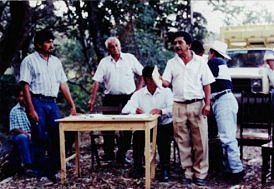
The high cost of producing coffee and the vicious cycle of indebtedness to middlemen has made it very difficult to export. For this reason, the Sexto Sol Center has always suggested to growers that they produce additional commercial crops. We have promoted the ethic of working collectively, what we call community action, to create other cooperative businesses for members of coffee collectives.
“You have heard the saying: ‘Give a man a fish… Teach him to fish and he eats for a lifetime.’ Why stop there? Organize a fishing cooperative to sell to the best market inland, create jobs canning the fish and make fish emulsion with the by-products for export, build a more businesses with earnings and divide profits among members, send the kids to school to become the future mangers and engineers for the cooperative, create a member owned bank, etc.” The Sexto Sol Center
At our suggestion, in 2001 some members of the coffee association “Cerro de la Olla” successfully produced and sold tomatoes to offset the high cost of producing coffee.
For many, many years, coffee farming has only provided farmers with a poor standard of living. Now, the international price crisis has dampened the dreams of millions of coffee farmers around the world. In the current context, growing only coffee has lost its potential to sustain farmers and their families. No one should live with the constant worry that one’s family will suffer hunger as has been the reality of coffee families for years. Therefore, in order to find solutions to the poverty that growers endure, our work is taking a different form as we adapt our efforts to meet the unfolding emergency in coffee country.
# SOLUTIONS
# Collaboration with ARDIGUA in Guatemala – cooperative coffee farms
(2003)
What has become more urgent in the context of the current price crisis is the need to insure that the farmers can simply survive with dignity before we think about helping them export. In the 2002 harvest, with prices at half the cost of production, many growers simple could not afford to pick their coffee. This has been a devastating blow for the effort to organize for export. It compels us to find other ways to assist small-scale coffee growers who are the majority of the rural population in the Sierra Madre.
As since our beginning, the Sexto Sol Center has promoted permaculture, a model for creating highly productive, sustainable farms to help coffee families produce their own food and other products to sell. Three years ago we established the Escuela de Agroecologia y Permacultura Tierra Linda (See Agro-ecology School section) where we teach sustainable food production and permaculture to farmers and others. Over 750 people have received training since 1999.
We are now concentrating our effort on helping coffee families to transition to production that frees them from depending entirely on coffee for earning a living. In December we began the initial outreach to honey farmers in the effort to form a cooperative to export organic honey. With honey production most of the work is done by the bees and expenses after the purchase of the hives is minimal. Honey production is compatible with efforts to protect and reforest the watershed. Hives can be placed among the coffee trees. There are several harvests a year rather than only one as with coffee. We are hopeful that honey can bring a “sweeter” future for hard working families and provide a means to generate income without clearing forest or coffee to plant other crops. We also explore the viability of promoting eco-tourism as an alternative source of income for coffee farmers.
Our main work with coffee growers is the project to assist the repatriated refugees, members of ARDDIGUA (Asociación Revolucionario Democratico para el Desarrolo Indegral de Guatemala), who are now farming coffee collectively in Guatemala.
Our work began in 1994 when they were in exile in Mexico and known as ARDIGUA (Asociación de Refugiados Dispersos de Guatemala). These courageous people (See article below below) have a commitment to pay off the government loans that allowed them to buy the 12 plantations where their members now live.
They have overcame terrible adversity and endured a long struggle to return from exile to a life that by design would allow them to collectively achieve a stable, productive living. It is tragic that their original plan of depending on coffee production now will only lead to their defaulting on these loans. We are working to help them find alternatives that will empower them to fulfil their commitment to return from exile to productive lives in Guatemala as has always been their intention since the days of their historic hunger strike in Guatemala City.
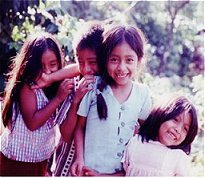
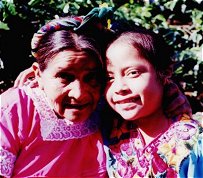
ARDDIGUA’s 12 collective coffee plantations in Guatemala could potentially become a powerful unified cooperative that will be a reliable source of quality organic honey, macadamia nuts, and coffee for export. We will continue the effort to help them become fair trade certified and to export their coffee. However, the initial work is to help them establish permaculture on each of the farms so that they can meet their needs for food.
# Strong Coffee: Former Refugees Grow Coffee on a Cooperative Farm in Guatemala
Tamara Brennan, Ph.D.
Coffee is grown in some of the most politically and culturally complex places in the world. For this very reason, the “richness” of a cup of a particular coffee can be more than a matter of flavor. In some special cases, the human qualities innate in a particular coffee give it profoundness beyond the taste experience. This added complexity is what makes the world of coffee so exotic and intriguing. The inspiring story of the new owners of the Nueva Eden coffee plantation in San Marcos province in Guatemala, all former refugees, is one such case.
The people of Guatemala are still reeling from 36 years of U.S. sponsored, brutal counter-insurgency war that largely targeted the majority Maya population. The army’s violence which destroyed over 500 Indian towns sent an estimated 250,000 people into exile. While 40,000 enjoyed the protection of United Nations sponsored refugee camps in Mexico, thousands of individuals chose to blend into the local population in the state of Chiapas, fearing that death squads would seek them out even in the camps. These “dispersed refugees” were former teachers, church workers, literacy teachers, leaders of women’s groups or participants in other such activities that the repressive forces deemed “subversive”. Therefore, among these refugees were people with the quality of leadership and the will to create a better conditions in their communities. They lived for 16 long years in this precarious illegal status in Mexico, but never lost the ambition to return to their beloved homeland to “create a better society”.
In 1992, the Association of Dispersed Refugees from Guatemala (ARDIGUA) formed to provide protection for these refugees and to begin the process of negotiating with their government for the conditions of their return. Their demands were simple; to be permitted to return in organized groups in a dignified manner rather than, as was the government’s preference, of individual families coming back to receive a few hundred dollars for resettlement and to blend in with the rest of the poor and landless. They refused to have their papers marked with the designation of “repatriated” like those who have only left to pick coffee for a few months. They wanted the truth of their persecution and of their survival as refugees to be recognized with the simple term of “retornado,” people who have now returned home.
ARDIGUA's plan was to obtain loans from the government to buy coffee plantations so that the people whose former homes, fields, and businesses had been lost would have a way to earn a living. What is extraordinary is that the plan from the beginning was to farm the plantations in a collective manner, something innovative for former corn farmers used to working alone in their fields. ARDIGUA organized refugees in Mexico with the message of creating Empresas Productivas Populares, or Collective Productive Enterprises upon their return.
They had no idea that it would take nearly 8 years, the occupations of two Guatemalan consular offices in Mexico and finally a hunger strike in front of the national palace before the government to finally would grant them the loans they needed. During those years they faced many devastating disappointments. More than once as people were packing for the triumphant return to Guatemala negotiations for purchase of several farms fell through. On the eve of finalizing one sale, the owner of the caved in to death threats from other plantation owners opposed to indigenous peasants becoming landowners on their scale. It is remarkable that they never gave up and today, two sizable coffee plantations are being farmed collectively by former refugees.
The 15 families who are the new owners of Nuevo Eden plantation are now picking their third harvest. But having struggled so long to get to this point, they now find themselves a bit overwhelmed with the prospect of managing the vast overgrown plantation. “We are corn farmers, we know we need technical help to face the challenges of producing coffee,” one leader explained. But as another man put it, “The advantage of working together is that instead of when you are working alone and thinking that you are doing things right, here a compañero will see a better way they you never thought of. It makes us stronger.”
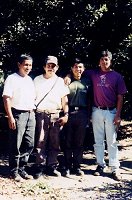
When they arrived at Nuevo Eden they discovered that the former manager had stolen everything that was not “too heavy to move”. Nevertheless they managed through the first harvest. However, as they are now picking coffee for the 2000 harvest, they face the uncertainty that plagues all coffee growers in the region who have no other way to sell their coffee than to the local middlemen. They can never know if the fluctuating and unpredictable price of coffee will cover the expense of production. Even so, they continue to pay better wages than their neighbors to the poor coffee pickers from the high country since, “ we do not intend to exploit poor people since we know exactly what they are going through.”
With the help of the Sexto Sol Center for Community Action, a NGO that provides consulting to peasant coffee growers (www.sextosol.org), they are just starting the process of preparing to export to buyers in the Specialty Market. This will involve much work but they see it as the only way that their hard won struggle will bring them the economic security they seek. This will include working for organic certification, Fair trade seals, and shade tree certification; all of the flags that will help turn the heads of potential buyers in their direction. Carlos Canoas hopes he can revive his early efforts to raise parasitoides wasps as biological control for the broca pest now that the others, who had thought that fumigating would get faster results, finally see that sustainable, organic methods will bring them a better price eventually. This harvest they are working to establish the practices that will ensure a high level of quality such as picking only the ripe berries, even though this extremely labor intensive practice will not bring them a better price in the short run.
They are determined to continue working collectively despite the fact that a third refugee plantation opted for “parcilización”, dividing up the land into individual parcels. The benefits of unity are obvious. They have managed to wire all the dispersed houses so that for a few hours each night, the bulbs hanging over their kitchen tables illuminate their homes, a comfort on nights when the heavy rains pound loudly on the leaky tin roofs. And so they go on, step by step, in a truly magnificent example of determination, perseverance and fortitude from the years of despair and isolation in Mexico to the triumph of picking coffee – from their own trees. At home at last with dignity. END
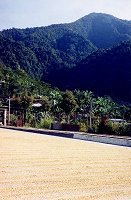
# Win-Win – Farmers and the Watershed, A Cause for Hope
A new emphasis on planting timber trees as shade for coffee has a great deal of economic promise for struggling farmers with the benefit of establishing a more sustainable source of wood. An association of larger coffee plantations in the lowlands has come up with an innovative plan to pull themselves out of the crisis. They are planting primavera trees among their coffee. Primavera is a native tropical tree with a valuable wood sought after for fine furniture. Inter-planted among the coffee, the trees provide the shade the coffee needs. By harvesting a portion of the growth each year, farmers can make exponentially greater earnings than their coffee has ever brought. (See Reforestation Section)
# "From our Archives –Prior to 2001
# There is a better way! – Forming Coffee Cooperatives"
“La Union Hace la Fuerza!” Unity Creates Strength! Since 1997, we have been organizing small-scale coffee growers from the Sierra Madre to overcome the obstacles to selling their quality coffee directly to the foreign importers.
For two years we have been working with an association of growers who are committed to doing the work needed to be export ready. They are committed to producing organically and selling cooperatively. Named after a famous poem about Chiapas, the organization “Chiapas es en el Cosmos” produces high altitude coffee that we one day hope to market under the name “Cosmic Coffee.”
The coffee is of exceptional quality and has unique characteristics. As the coffee gains recognition in the market, the growers will reap the benefits of having committed to selling collectively. As one grower said to his fellow growers, “We’ve got to leave our fears behind and trust ourselves enough to take the control of our destiny in our own hands.”
The Sexto Sol Center specifically works to help the farmers to adopt organic methods of farming, soil conservation and reforestation with shade trees. All of these measures help to repair the damage done to the Sierra Madre watershed. Another goal is to help them to obtain certification as being a fair trade organization, a designation without which emerging grassroots organizations do not have access to those importers who purchase coffee for the fair trade price.
Sexto Sol Coffee promotes coffee from the Sierra in the Specialty Coffee market, a niche in the industry which brings exotic gourmet quality coffees to upscale restaurants, roasters and stores. We believe that selling directly to the Specialty Market is the way we can free the growers from the slavery to prices set in New York on the futures market by speculators who make fortunes trading paper while the producers live in perpetual misery. Toward this goal, we are working to help the farmers to achieve the highest standard of quality of their coffee so as to attract buyers who will pay a better price. Special care must be taken at each stage of the harvest and the time sensitive steps of processing the fruit and preparing it to send to the mill.
The coffee that the farmers produce has potential gourmet quality. With infra-structure and organization such as we are creating with growers, a fine quality, certified organic, shade-tree coffee will be brought to Specialty Coffee buyers in a manner which will bring top dollar to the farmers. This holds the great promise to impact the economy of the entire region.
Ultimately, we would like to see the coffee farmers of Chiapas reach such a level of organization that could liberate them altogether from the arbitrary pricing structure set in New York as was achieved in Columbia. As organizers and advocates we invite the growers to dream of a better future and to then take the steps toward achieving it.
 The Sexto Sol Center
The Sexto Sol Center 